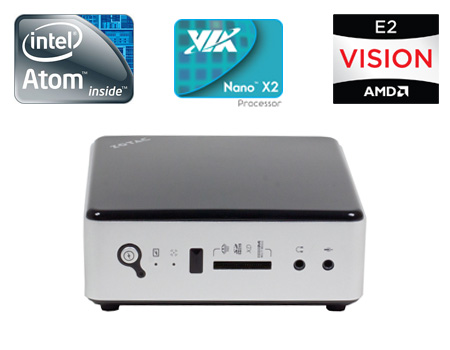Good Things In Small Packages: Seven Nettop Platforms, Tested
It'd be easy to dismiss nettops as underpowered attempts at miniaturization, but they’re good enough for surfing the Web, writing emails, and watching some video. Today, we're comparing seven different platforms based on CPUs from Intel, AMD, and VIA.
You Don’t Need Six Cores To Surf The Net
As hardware enthusiasts, it’s a point of personal pride for us to build systems using the newest, best, and fastest components whenever we can. That approach makes a lot of sense for hardcore gamers looking for the best performance within a certain budget. By the same token, if you use your rig for professional applications, investing in an expensive hexa-core CPU with twelve threads can pay for itself very quickly. Every second you're not waiting for your machine to finish a task is money in the bank.
It’s easy to forget, then, that for many usage models, massive processing power is simply overkill. If all you’re planning to do is browse the Web, compose emails, or balance the family budget in Excel, you don't need a multi-core overclocked processor with the latest graphics card. An affordable nettop gets the job done just fine.
Although these little boxes aren't designed to pack much of a punch, and they don't necessarily fare well in efficiency metrics, they do have their strengths. On one hand, their low-power CPUs allow for very small and quiet devices that look more like a stack of CDs than a computer. On the other, they use very little power. It'd be almost impossible to match them using desktop-class hardware. And yet, they still offer enough performance for basic productivity-oriented apps.
For a while there, the word nettop was practically synonymous with Intel’s Atom processor. But that's no longer the case, and there is quite a variety of models based on other platforms, too. That's why we wanted to take a more comprehensive look at the competitive landscape and see how they all stack up. Originally, our plan was to invite several companies to submit models for testing. However, multiple vendors ended up offering us very similar hardware, prompting us to go another direction instead.
Zotac is very well known as a purveyor of compact nettop-class systems, and its product portfolio pretty much covers all of the available hardware able to fit inside a compact chassis. It made sense, then, to simply pull models from Zotac's catalog.
So, today we're taking a look seven currently-available combinations of nettop hardware from Intel, AMD, and VIA.
Representing AMD, we have the two Brazos family flagships: E-350 and E-450. Intel-based entries are both the most numerous and the most varied. There’s the pedestrian Atom D525 (Pine Trail) supported by Nvidia's Ion 2 GPU, an Atom D2700 (Cedar Trail) processor paired with a GT 520M graphics, a Celeron 857, and Core i3-2330M. Those last two are Sandy Bridge-based parts, and both lean on their integrated HD Graphics engines. Built around VIA’s Nano X2 U4025 and its Chrome9 GPU, our final platform comes out of left field, which makes it all the more interesting. Don’t let its age fool you; this little CPU has more bite than we originally suspected.
Get Tom's Hardware's best news and in-depth reviews, straight to your inbox.
Current page: You Don’t Need Six Cores To Surf The Net
Next Page Sorting Through The Specs: Seven Nettops, Detailed-
falchard I think this review is bias. Its missing the AMD small form factor benchmark. Any game.Reply -
A Bad Day JOSHSKORNIn all honesty, when it can run Crysis...I'll be impressed. Until then...alrighty.Reply
Well, if you run it in:
-320p resolution
-Directx 8
-All eyecandy off
You'll get around 5-10 FPS. -
bavman These things suck. Why would you dish out the $300-400 theyre asking for them? I recently built a file server that was basically a dumbed down tower with an g620 cpu, 4 gigs of ram for under $200 (excluding all the hdds). Throw in a $50 graphics card and it would dominate any of these nettops.Reply -
friskiest bavmanThese things suck. Why would you dish out the $300-400 theyre asking for them? I recently built a file server that was basically a dumbed down tower with an g620 cpu, 4 gigs of ram for under $200 (excluding all the hdds). Throw in a $50 graphics card and it would dominate any of these nettops.Reply
You pay for the size, power and niche factor in here,.. these are Nettops,.. you're not supposed to play AA or AAA games in here,. just browse the net,. watch movies and listen to music- as implied
-
Nintendo Maniac 64 What I really want to see is a nettop using AMD's 17w A6-4455M. Being a Trinity APU, it actually WOULD have enough grunt to run Crysis, and without it looking like crap to boot!Reply -
molo9000 Shame these still aren't good at H.264 decoding. They would make great HTPCs.Reply
The hardware decoding of the VIA chipset would be a killer feature, if there actually was some software that supported it. Seems like XBMC doesn't support it either. -
daglesj I rolled out a load of Ion 330 Asrock boxes a couple of years ago for business use. Customers still love their little black boxes. These were the early 1.6Ghz dual core Atoms.Reply
For work use (basically 95% of what 95% of the worlds computers users actually do in the REAL world) they work great.
There is more to life than endless benchmarking and Crysis.
